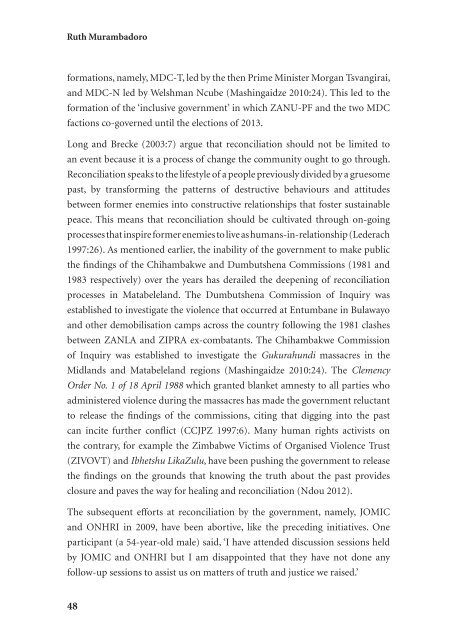ACCORD-ajcr-2015-1
ACCORD-ajcr-2015-1
ACCORD-ajcr-2015-1
- No tags were found...
You also want an ePaper? Increase the reach of your titles
YUMPU automatically turns print PDFs into web optimized ePapers that Google loves.
Ruth Murambadoro<br />
formations, namely, MDC-T, led by the then Prime Minister Morgan Tsvangirai,<br />
and MDC-N led by Welshman Ncube (Mashingaidze 2010:24). This led to the<br />
formation of the ‘inclusive government’ in which ZANU-PF and the two MDC<br />
factions co-governed until the elections of 2013.<br />
Long and Brecke (2003:7) argue that reconciliation should not be limited to<br />
an event because it is a process of change the community ought to go through.<br />
Reconciliation speaks to the lifestyle of a people previously divided by a gruesome<br />
past, by transforming the patterns of destructive behaviours and attitudes<br />
between former enemies into constructive relationships that foster sustainable<br />
peace. This means that reconciliation should be cultivated through on-going<br />
processes that inspire former enemies to live as humans-in-relationship (Lederach<br />
1997:26). As mentioned earlier, the inability of the government to make public<br />
the findings of the Chihambakwe and Dumbutshena Commissions (1981 and<br />
1983 respectively) over the years has derailed the deepening of reconciliation<br />
processes in Matabeleland. The Dumbutshena Commission of Inquiry was<br />
established to investigate the violence that occurred at Entumbane in Bulawayo<br />
and other demobilisation camps across the country following the 1981 clashes<br />
between ZANLA and ZIPRA ex-combatants. The Chihambakwe Commission<br />
of Inquiry was established to investigate the Gukurahundi massacres in the<br />
Midlands and Matabeleland regions (Mashingaidze 2010:24). The Clemency<br />
Order No. 1 of 18 April 1988 which granted blanket amnesty to all parties who<br />
administered violence during the massacres has made the government reluctant<br />
to release the findings of the commissions, citing that digging into the past<br />
can incite further conflict (CCJPZ 1997:6). Many human rights activists on<br />
the contrary, for example the Zimbabwe Victims of Organised Violence Trust<br />
(ZIVOVT) and Ibhetshu LikaZulu, have been pushing the government to release<br />
the findings on the grounds that knowing the truth about the past provides<br />
closure and paves the way for healing and reconciliation (Ndou 2012).<br />
The subsequent efforts at reconciliation by the government, namely, JOMIC<br />
and ONHRI in 2009, have been abortive, like the preceding initiatives. One<br />
participant (a 54-year-old male) said, ‘I have attended discussion sessions held<br />
by JOMIC and ONHRI but I am disappointed that they have not done any<br />
follow-up sessions to assist us on matters of truth and justice we raised.’<br />
48


